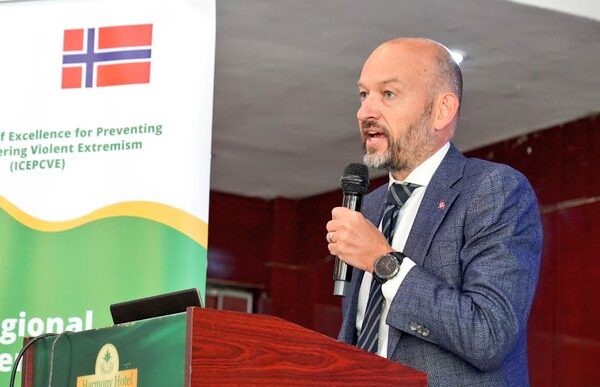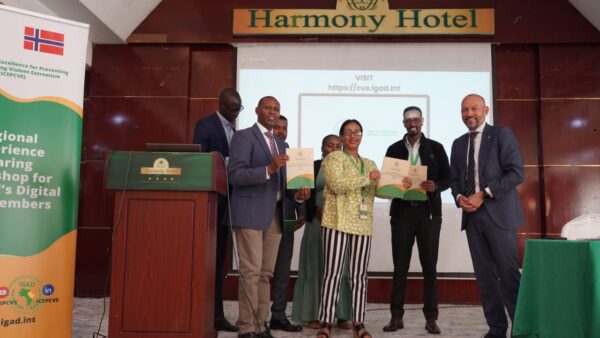IGAD launches new guide to boost media and civil society efforts in combating extremism

The guide, launched in Addis Ababa by Norway’s Ambassador to Ethiopia Stian Christensen, draws from last year’s discussions between the two sectors on how to better understand community realities and create safe spaces for information and experience sharing.
The IGAD Centre of Excellence for Preventing and Countering Violent Extremism (ICEPCVE) on Tuesday unveiled a guide outlining best practices for collaboration between the media and civil society in advancing inclusive approaches to preventing violent extremism.
The guide, launched in Addis Ababa by Norway’s Ambassador to Ethiopia Stian Christensen, draws from last year’s discussions between the two sectors on how to better understand community realities and create safe spaces for information and experience sharing.
More To Read
- Activist sues EACC, DPP, KICC boss over alleged illegal arrest and detention
- Kenya Kwanza under fire: Civil groups decry killings, graft and constitutional violations
- IEBC proposes shared broadcast signal to restore trust in 2027 polls
- Kenya adopts new media code, ushering in stricter AI and child protection rules
- Coast civil society groups demand inclusive dialogue to calm unrest
- IEBC calls on media to help rebuild trust in electoral system
It offers a practical checklist for effective collaboration, including ethical and responsible communication, balanced storytelling, resource sharing, and joint advocacy and messaging.
Highlighting the significance of this partnership, Christensen said the collaboration reflects a “shared commitment to peace, resilience, and community-led solutions to one of the most pressing challenges of the time, violent extremism.”
"Let me begin by thanking IGAD's leadership, commitment, and cooperation in the fight against violent extremism, as we all know, the region badly needs that kind of support," he said during the launch, attended by media practitioners and CSOs from IGAD member states.
 The Ambassador of Norway to Ethiopia, Stian Christensen (far right) and Dr Simon Nyambura, the Director, IGAD's Centre for Preventing and Countering Violent Extremism, unveiled the first media–Civil Society Organisations' guide to advancing inclusive approaches to preventing violent extremism in the region. (Photo: Naliston Njagi)
The Ambassador of Norway to Ethiopia, Stian Christensen (far right) and Dr Simon Nyambura, the Director, IGAD's Centre for Preventing and Countering Violent Extremism, unveiled the first media–Civil Society Organisations' guide to advancing inclusive approaches to preventing violent extremism in the region. (Photo: Naliston Njagi)
A collective challenge
He further urged more states to support such initiatives, noting that violent extremism is a collective challenge.
"There is a tendency globally to look inward, to look at our own countries rather than recognise that we are all in the same environment, and if we don't help each other, I think the bigger picture is, if you sit in first class, then the plane crashes, it doesn't really help you. We are all going to go down, or we survive together," he added.
The centre, which promotes soft approaches to countering violent extremism through research, training, and dialogue platforms, also launched a revitalised digital hub.
The hub serves as a safe space for anonymous sharing of information and experiences on emerging threats often overlooked in the region.
"Communities, civil society, and the media must be engaged as equal partners. These peer-to-peer exchanges are exactly in line with IGAD's vision of building locally owned, community-driven responses to violent extremism," said Christensen, urging participants to counter terrorist narratives rooted in fear, division, and mistrust.
ICEPCVE Director Simon Nyambura said both the guide and the hub align with the centre’s efforts to strengthen early warning systems.
"We have been building this network, and now we are happy to say we have a critical network of youth, media, and civil society that we have been able to connect within a digital hub," he said, urging them to boldly call out societal ills fuelling violent extremism.
Top Stories Today












































